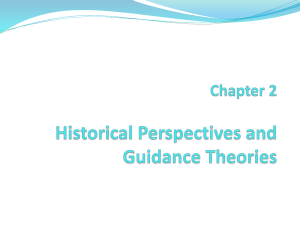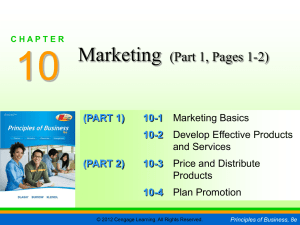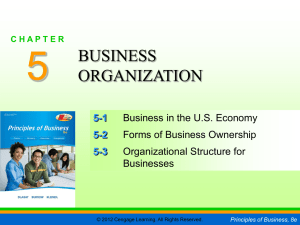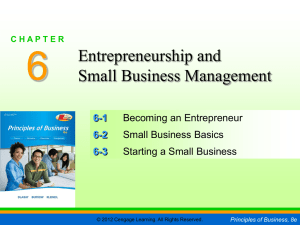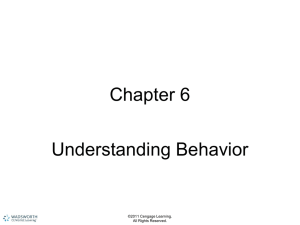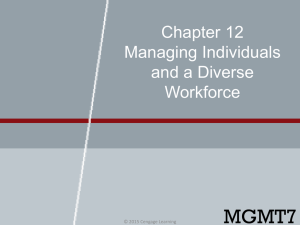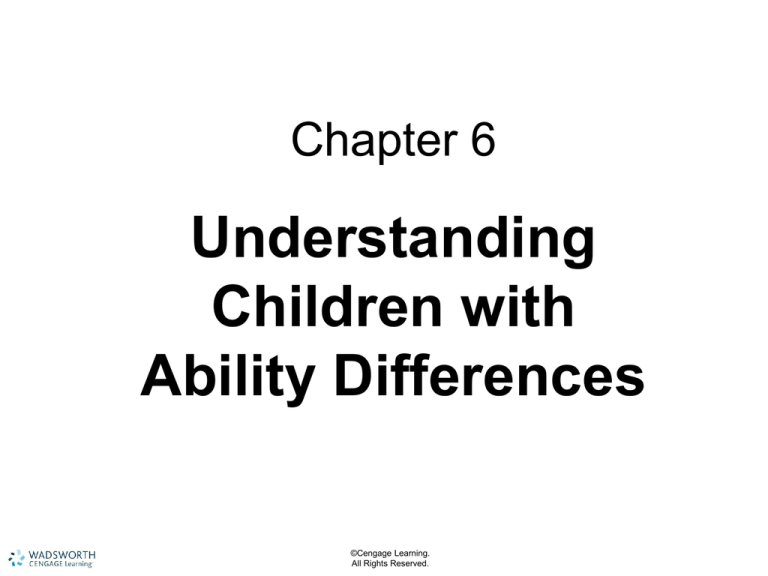
Chapter 6
Understanding
Children with
Ability Differences
©Cengage Learning.
All Rights Reserved.
Why study different ability
levels?
• By knowing about different ability levels we
are prepared to…
– Notice a child who may need to be referred for
screening
– Avoid making offensive and embarrassing
cultural mistakes
– Help typically developing children become more
tolerant
– Communicate with the families of a child with a
different ability level
– Interact successfully with diverse children
©Cengage Learning.
All Rights Reserved.
Hidden causes of problems
• Some children have undiagnosed special
needs
• Some children have endured abuse or
have suffered traumatic events that we
may never know about
• Be understanding and patient if you don’t
understand behavior
©Cengage Learning.
All Rights Reserved.
Rely on DAP
• Children with differing
ability levels need
developmentally
appropriate practice
(DAP)
• They need DAP as
much as typically
developing children
©Cengage Learning.
All Rights Reserved.
What do children with different ability
levels need?
• Children with different ability levels have as
many unique needs as there are children
• Help them interact, learn and play as
normally as possible with their typically
developing peers
• They need caring, assertive, positive
guidance and DAP
©Cengage Learning.
All Rights Reserved.
Help parents cope
• Families learning that their young child has a
different ability level go through a great deal
of shock and pain
• All parents need communication and support,
but parents of children with different ability
levels have special needs and special
vulnerabilities
• Patience, understanding and encouragement
are especially required for these parents
©Cengage Learning.
All Rights Reserved.
Help each child feel valued
• Focus on each child’s strengths
• Every child has positive characteristics and
assets
• Show unconditional affection to every child
every day
• Remember to communicate at eye level, use
the child’s name and use appropriate touch
©Cengage Learning.
All Rights Reserved.
Teach Tolerance
• Teach all of the children how to…
– Celebrate differences
– Show compassion
– Express caring for peers
• Prevent bullying and stigmatizing
©Cengage Learning.
All Rights Reserved.
Have Fun
• Have a sense of humor
• Make sure that the environment is filled
with joy
©Cengage Learning.
All Rights Reserved.
Welcome Children with
different ability levels
• Learn about your legal responsibilities
• Adapt your learning environment to ensure
that it invites and supports ALL children in
your class
©Cengage Learning.
All Rights Reserved.
Accommodations
• Special aids provided for persons with different
ability levels to provide them access to mainstream
activities and environments
• Accommodations can include such things as…
–
–
–
–
–
–
a ramp for a wheelchair
a lowered sink
special door handles
signs written in Braille
a sign language translator
any number of other changes needed to help the person with a
different ability level function equitably
©Cengage Learning.
All Rights Reserved.
Individuals with different ability
levels Education Act (IDEA)
• A law ensuring services to children with different
ability levels
• It provides early intervention, special education and
related services to eligible infants, toddlers, children
and youth with different ability levels
• It requires that students be provided a Free
Appropriate Public Education (FAPE) preparing
them for further education, employment and
independent living
• Special education must provide the Least Restrictive
Environment (LRE), which is the environment most
like that of typical children in which the child with a
different ability level can succeed
©Cengage Learning.
All Rights Reserved.
Free Appropriate Public
Education (FAPE)
• A directive requiring that school districts
provide children with different ability levels
access to general education as well as
specialized educational services to
accommodate special needs
• It also requires that children with different
ability levels receive support free of charge,
the same as is provided to non-differently
abled students.
©Cengage Learning.
All Rights Reserved.
Individualized Education
Program (IEP)
• A written plan that describes exactly how
teachers, parents, school administrators,
related services personnel, and the student
will work together to improve educational
results for the specific child with a different
ability level
©Cengage Learning.
All Rights Reserved.
Red Flags
• Parents, teachers, and caregivers should
never attempt to diagnose physical
ailments or developmental delays
• They should, however, watch carefully for
indications that a child needs further
evaluation by a physician or other expert
to rule out or confirm physical or
psychological problems
©Cengage Learning.
All Rights Reserved.
Focus on a Few Key Disorders
• In addition to emotional neediness, there are
numerous illnesses and physiological
conditions that can cause children to behave
unproductively
• Early childhood professionals can’t know the
names of all possibilities, but should know a
few key conditions and terms
©Cengage Learning.
All Rights Reserved.
Attention Deficit Disorder/Attention
Deficit Hyperactivity Disorder
• A complex biological disorder
• Characterized by…
– Inattention
– Impulsiveness
– Forgetfulness
– Poor impulse control
– Distractibility
– Extremely high levels of physical activity
©Cengage Learning.
All Rights Reserved.
Pervasive Developmental
Disorders (PDD)
• A group of neurodevelopmental
disorders
• Characterized by severe delays in the
development of social skills and the
ability to communicate with others
©2010 Cengage Learning.
All Rights Reserved.
Neurodevelopment
• The development of the brain pathways that
make the integration of sensory information
possible
• These pathways increase in capacity and
complexity as children
– Play
– Learn
– Grow
©2010 Cengage Learning.
All Rights Reserved.
Autism
• A specific PDD developmental brain
disorder characterized by
– Impaired social interaction and communication
skills
– Avoidance of eye-to-eye gaze
– A limited range of activities and interests
©2010 Cengage Learning.
All Rights Reserved.
Mind Blindness
• A brain disorder that impairs one’s ability to
“read minds” by noticing
– Gestures
– Facial expressions
– Changes in tone of voice
• An inability to fathom what is in the mind of
another person
©2010 Cengage Learning.
All Rights Reserved.
Asperger’s Disorder
• A disorder with many of the characteristics
of autism
• HOWEVER—a child diagnosed with
Asperger’s has normal or above average
communication and/or cognitive
development
©2010 Cengage Learning.
All Rights Reserved.
Pica
• A peculiar eating disorder in which one
compulsively nibbles non-food substances
such as
– Dirt
– Chalk
– Paper
– Gravel
– Leaves
– Toy parts
©Cengage Learning.
All Rights Reserved.
Fetal Alcohol Spectrum
Disorders
• A group of permanent birth defects caused
by a mother drinking alcohol during
pregnancy
• Alcohol damage to the fetus can cause
behavioral and cognitive damage
• No amount of alcohol during pregnancy has
been determined to be a safe level
©Cengage Learning.
All Rights Reserved.
Sensory Integration Dysfunction
• A disorder characterized by the inability of
the brain to correctly process information
brought in by the senses
©Cengage Learning.
All Rights Reserved.
Proprioceptive Sense
• The proprioceptive sense integrates sensory
information taken in through the muscles,
connecting tissue, skin and joints to signal
the brain where one’s body is in time and
space
• Proprioception refers to the brain’s
unconscious sense of body-in-space
• It is the sense that makes it possible for a
person to move his body parts without
having to watch the movement to make sure
it is happening
©Cengage Learning.
All Rights Reserved.
Vestibular Sense
• One’s vestibular sense serves as one’s
balance system, which, like the
proprioceptive sense, provides perception of
movement and orientation in space
• The vestibular sense is essential for a person
to…
– Maintain muscle tone
– Coordinate both sides of the body
– To hold the head upright against gravity
©Cengage Learning.
All Rights Reserved.
Learning disability
• Any of various cognitive, neurological, or
psychological disorders that interferes with
the ability to learn
• Affects the brain's ability to
– Receive
– Process
– Analyze
– Store information
©Cengage Learning.
All Rights Reserved.
Dyslexia
• Cognitive disorder in which a person's reading
and/or writing ability is significantly lower than
expected given
– his exposure to appropriate instruction
– his normal intellectual ability
– his lack of sensory problems such as poor
eyesight
©Cengage Learning.
All Rights Reserved.
Oppositional Defiant Disorder
• A disorder in which there is an ongoing
pattern of behavior toward authority figures
that is…
– Uncooperative
– Defiant
– Hostile
• Behavior seriously interferes with a child’s
day-to-day functioning
• The child goes well beyond the bounds of
normal childhood behavior
©Cengage Learning.
All Rights Reserved.
Self-regulation
• A process by which one manages without
external control
• Being able to deal with problems appropriately
and independently
• The ability to tolerate the feelings of distress that
accompany an unmet need and focus one’s
thoughts, sensations, and actions on the
attainment of a goal
• Resisting or delaying gratification; inhibiting
impulses and paying attention are all examples
of children's self-regulatory (or self-control) skills
©Cengage Learning.
All Rights Reserved.
Tourette’s Disorder
• A disorder characterized by multiple motor
and vocal tics
©Cengage Learning.
All Rights Reserved.
Motor Tic
• A sudden involuntary muscular contraction—often
of the facial, shoulder or neck muscles
• Complex motor tics include distinct, obsessively
repeated, intricate actions or behaviors such as…
– Twirling
– Hopping
– Obsessively lining things up in straight rows
• Tics tend to become more pronounced when one is
under stress
©Cengage Learning.
All Rights Reserved.
Vocal Tic
• A sudden involuntary vocalization such as a…
–
–
–
–
–
Yip
Whistle
Grunt
Cough
Bark
• A complex vocal tic is a distinct, obsessively repeated
phrase or the intricate obsessive use of words, such
as repeating everything other people say
©Cengage Learning.
All Rights Reserved.
Bibliotherapy
• There are many appropriate books about
different ability levels that can be used to help
children address their curiosity and ease their
worrisome feelings such as…
– Fear
– Anxiety
– Apprehension
©Cengage Learning.
All Rights Reserved.

